最新初中英语语法知识—疑问句的知识点复习(3)
- 格式:docx
- 大小:16.76 KB
- 文档页数:9
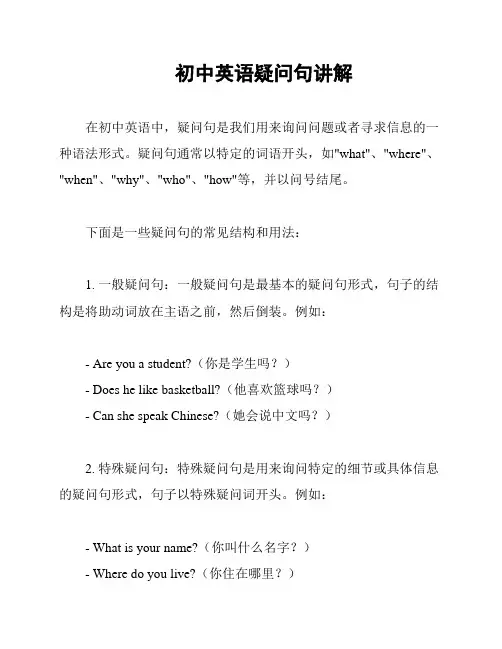
初中英语疑问句讲解在初中英语中,疑问句是我们用来询问问题或者寻求信息的一种语法形式。
疑问句通常以特定的词语开头,如"what"、"where"、"when"、"why"、"who"、"how"等,并以问号结尾。
下面是一些疑问句的常见结构和用法:1. 一般疑问句:一般疑问句是最基本的疑问句形式,句子的结构是将助动词放在主语之前,然后倒装。
例如:- Are you a student?(你是学生吗?)- Does he like basketball?(他喜欢篮球吗?)- Can she speak Chinese?(她会说中文吗?)2. 特殊疑问句:特殊疑问句是用来询问特定的细节或具体信息的疑问句形式,句子以特殊疑问词开头。
例如:- What is your name?(你叫什么名字?)- Where do you live?(你住在哪里?)- When is the party?(派对是什么时候?)- Why did she cry?(她为什么哭了?)- How did they win the game?(他们是如何赢得比赛的?)3. 选择疑问句:选择疑问句是用来在两个或多个选项之间做出选择的疑问句形式。
句子以"or"连接不同的选项。
例如:- Do you want coffee or tea?(你想要咖啡还是茶?)- Are you going by car or by bus?(你是坐车还是坐公交?)4. 否定疑问句:否定疑问句是用来提出带有否定意义的问题的疑问句形式。
句子通常以"don't"或"doesn't"开头。
例如:- Don't you like pizza?(你不喜欢比萨吗?)- Doesn't she have a dog?(她没有狗吗?)总结:初中英语中的疑问句结构和用法有多种类型,包括一般疑问句、特殊疑问句、选择疑问句和否定疑问句。
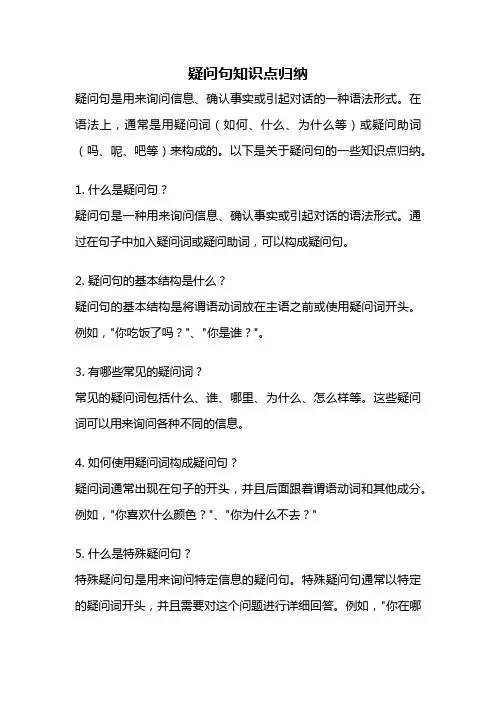
疑问句知识点归纳疑问句是用来询问信息、确认事实或引起对话的一种语法形式。
在语法上,通常是用疑问词(如何、什么、为什么等)或疑问助词(吗、呢、吧等)来构成的。
以下是关于疑问句的一些知识点归纳。
1. 什么是疑问句?疑问句是一种用来询问信息、确认事实或引起对话的语法形式。
通过在句子中加入疑问词或疑问助词,可以构成疑问句。
2. 疑问句的基本结构是什么?疑问句的基本结构是将谓语动词放在主语之前或使用疑问词开头。
例如,"你吃饭了吗?"、"你是谁?"。
3. 有哪些常见的疑问词?常见的疑问词包括什么、谁、哪里、为什么、怎么样等。
这些疑问词可以用来询问各种不同的信息。
4. 如何使用疑问词构成疑问句?疑问词通常出现在句子的开头,并且后面跟着谓语动词和其他成分。
例如,"你喜欢什么颜色?"、"你为什么不去?"5. 什么是特殊疑问句?特殊疑问句是用来询问特定信息的疑问句。
特殊疑问句通常以特定的疑问词开头,并且需要对这个问题进行详细回答。
例如,"你在哪里工作?"、"你是怎么学会弹吉他的?"6. 什么是一般疑问句?一般疑问句是用来询问肯定或否定的事实的疑问句。
一般疑问句通常以动词开头,并且可以通过肯定或否定的回答来回答问题。
例如,"你喜欢吃苹果吗?"、"他会来吗?"7. 什么是选择疑问句?选择疑问句是用来询问两个或多个选项之间的选择的疑问句。
选择疑问句通常以或者、还是等词开头,并且需要从给定的选项中选择一个选项来回答问题。
例如,"你想要茶还是咖啡?"、"你是喜欢夏天还是冬天?"8. 疑问句可以用来引起对话吗?是的,疑问句通常用来引起对话或启动一段对话。
通过提出问题,可以让对方参与到对话中,进一步交流和沟通。
9. 疑问句可以用来确认事实吗?是的,疑问句可以用来确认事实或确认某个陈述的正确性。
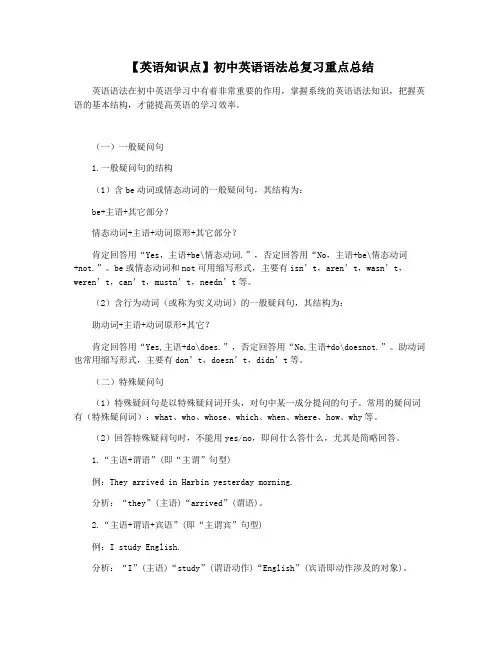
【英语知识点】初中英语语法总复习重点总结英语语法在初中英语学习中有着非常重要的作用,掌握系统的英语语法知识,把握英语的基本结构,才能提高英语的学习效率。
(一)一般疑问句1.一般疑问句的结构(1)含be动词或情态动词的一般疑问句,其结构为:be+主语+其它部分?情态动词+主语+动词原形+其它部分?肯定回答用“Yes,主语+be\情态动词.”,否定回答用“No,主语+be\情态动词+not.”。
be或情态动词和not可用缩写形式,主要有isn’t,aren’t,wasn’t,weren’t,can’t,mustn’t,needn’t等。
(2)含行为动词(或称为实义动词)的一般疑问句,其结构为:助动词+主语+动词原形+其它?肯定回答用“Yes,主语+do\does.”,否定回答用“No,主语+do\doesnot.”。
助动词也常用缩写形式,主要有don’t,does n’t,didn’t等。
(二)特殊疑问句(1)特殊疑问句是以特殊疑问词开头,对句中某一成分提问的句子。
常用的疑问词有(特殊疑问词):what、who、whose、which、when、where、how、why等。
(2)回答特殊疑问句时,不能用yes/no,即问什么答什么,尤其是简略回答。
1.“主语+谓语”(即“主谓”句型)例:They arrived in Harbin yesterday morning.分析:“they”(主语)“arrived”(谓语)。
2.“主语+谓语+宾语”(即“主谓宾”句型)例:I study English.分析:“I”(主语)“study”(谓语动作)“English”(宾语即动作涉及的对象)。
3.“主语+谓语+间接宾语+直接宾语”(即“主谓双宾”句型)例:Our teacher taught us English.分析:“our teacher”(主语)“教”(谓语动作)“us”(间接宾语)“English”(直接宾语)。
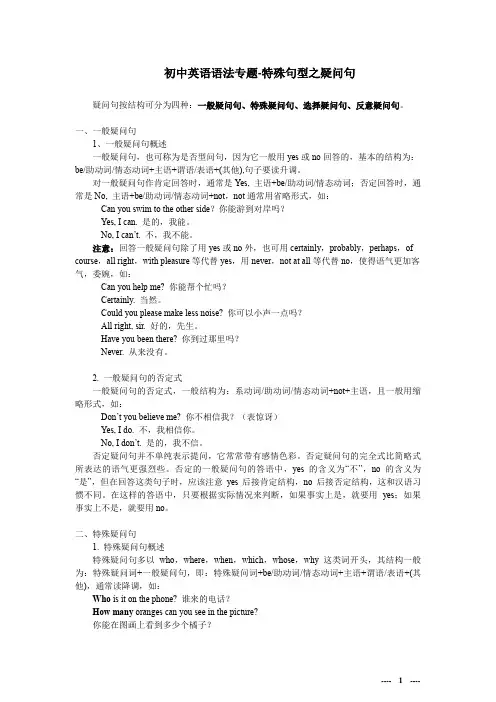
初中英语语法专题-特殊句型之疑问句疑问句按结构可分为四种:一般疑问句、特殊疑问句、选择疑问句、反意疑问句。
一、一般疑问句1、一般疑问句概述一般疑问句,也可称为是否型问句,因为它一般用yes或no回答的,基本的结构为:be/助动词/情态动词+主语+谓语/表语+(其他),句子要读升调。
对一般疑问句作肯定回答时,通常是Yes, 主语+be/助动词/情态动词;否定回答时,通常是No, 主语+be/助动词/情态动词+not,not通常用省略形式,如:---Can you swim to the other side?你能游到对岸吗?---Yes, I can. 是的,我能。
---No, I can’t. 不,我不能。
注意:回答一般疑问句除了用yes或no外,也可用certainly,probably,perhaps,of course,all right,with pleasure等代替yes,用never,not at all等代替no,使得语气更加客气,委婉,如:---Can you help me? 你能帮个忙吗?---Certainly. 当然。
---Could you please make less noise? 你可以小声一点吗?---All right, sir. 好的,先生。
---Have you been there? 你到过那里吗?---Never. 从来没有。
2. 一般疑问句的否定式一般疑问句的否定式,一般结构为:系动词/助动词/情态动词+not+主语,且一般用缩略形式,如:---Don’t you believe me? 你不相信我?(表惊讶)---Yes, I do. 不,我相信你。
---No, I don’t. 是的,我不信。
否定疑问句并不单纯表示提问,它常常带有感情色彩。
否定疑问句的完全式比简略式所表达的语气更强烈些。
否定的一般疑问句的答语中,yes的含义为“不”,no的含义为“是”,但在回答这类句子时,应该注意yes后接肯定结构,no后接否定结构,这和汉语习惯不同。
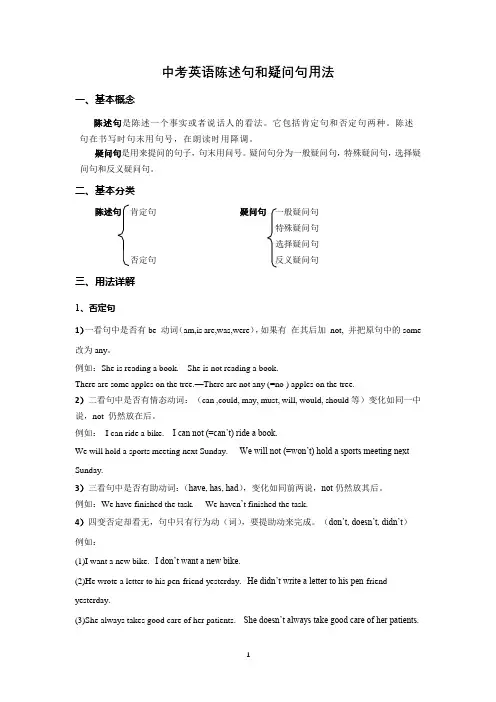
中考英语陈述句和疑问句用法一、基本概念陈述句是陈述一个事实或者说话人的看法。
它包括肯定句和否定句两种。
陈述句在书写时句末用句号,在朗读时用降调。
疑问句是用来提问的句子,句末用问号。
疑问句分为一般疑问句,特殊疑问句,选择疑问句和反义疑问句。
二、基本分类陈述句肯定句疑问句一般疑问句特殊疑问句选择疑问句否定句反义疑问句三、用法详解1、否定句1)一看句中是否有be 动词(am,is are,was,were),如果有在其后加not, 并把原句中的some 改为any。
例如:She is reading a book.---She is not reading a book.There are some apples on the tree.—There are not any (=no ) apples on the tree.2)二看句中是否有情态动词:(can ,could, may, must, will, would, should等)变化如同一中说,not 仍然放在后。
例如:I can ride a bike.---I can not (=can’t) ride a book.We will hold a sports meeting next Sunday.----We will not (=won’t) hold a sports meeting next Sunday.3)三看句中是否有助动词:(have, has, had),变化如同前两说,not仍然放其后。
例如:We have finished the task.----We haven’t finished the task.4)四变否定却看无,句中只有行为动(词),要提助动来完成。
(don’t, doesn’t, didn’t)例如:(1)I want a new bike.--I don’t want a new bike.(2)He wrote a letter to his pen-friend yesterday.--He didn’t write a letter to his pen-friend yesterday.(3)She always takes good care of her patients. --She doesn’t always take good care of her patients.当借助doesn’t和didn’t 构成否定后,行为动词要还原为原形。
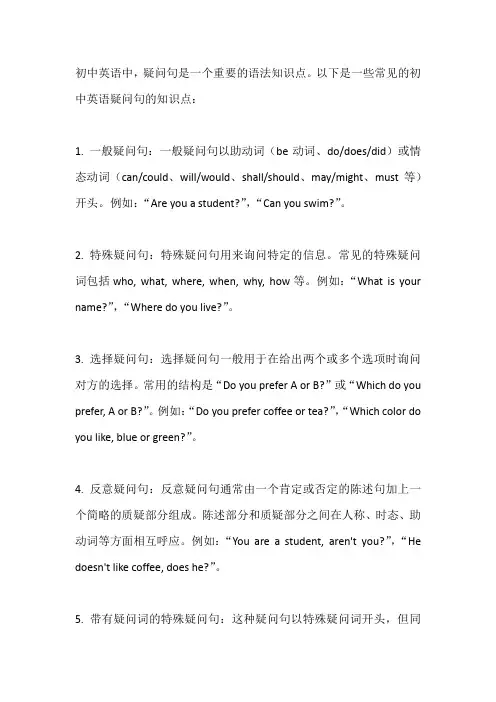
初中英语中,疑问句是一个重要的语法知识点。
以下是一些常见的初中英语疑问句的知识点:1. 一般疑问句:一般疑问句以助动词(be动词、do/does/did)或情态动词(can/could、will/would、shall/should、may/might、must等)开头。
例如:“Are you a student?”,“Can you swim?”。
2. 特殊疑问句:特殊疑问句用来询问特定的信息。
常见的特殊疑问词包括who, what, where, when, why, how等。
例如:“What is your name?”,“Where do you live?”。
3. 选择疑问句:选择疑问句一般用于在给出两个或多个选项时询问对方的选择。
常用的结构是“Do you prefer A or B?”或“Which do you prefer, A or B?”。
例如:“Do you prefer coffee or tea?”,“Which color do you like, blue or green?”。
4. 反意疑问句:反意疑问句通常由一个肯定或否定的陈述句加上一个简略的质疑部分组成。
陈述部分和质疑部分之间在人称、时态、助动词等方面相互呼应。
例如:“You are a student, aren't you?”,“He doesn't like coffee, does he?”。
5. 带有疑问词的特殊疑问句:这种疑问句以特殊疑问词开头,但同时也包含了一般疑问句的结构。
例如:“What time do you usually get up?”,“How often do you exercise?”。
学生在学习疑问句时需要注意以下几点:-疑问句的变换方式,如将陈述句转换为一般疑问句、特殊疑问句等;-特殊疑问词的使用及其不同的含义和用法;-语序的变化,特别是特殊疑问句中主语和谓语的位置变化。
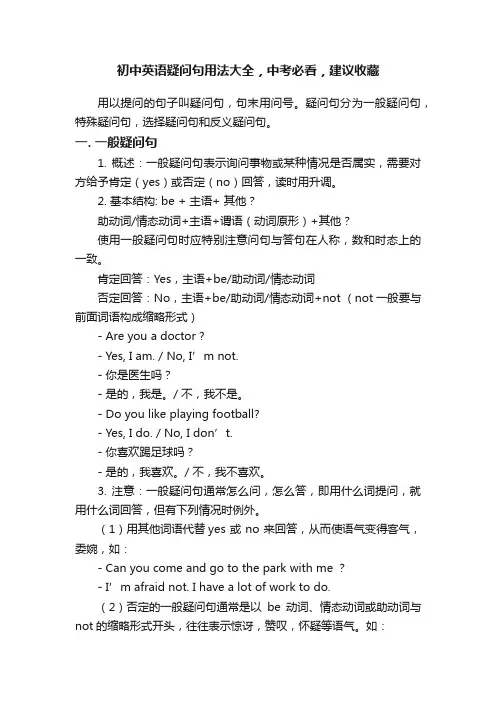
初中英语疑问句用法大全,中考必看,建议收藏用以提问的句子叫疑问句,句末用问号。
疑问句分为一般疑问句,特殊疑问句,选择疑问句和反义疑问句。
一. 一般疑问句1. 概述:一般疑问句表示询问事物或某种情况是否属实,需要对方给予肯定(yes)或否定(no)回答,读时用升调。
2. 基本结构: be + 主语+ 其他?助动词/情态动词+主语+谓语(动词原形)+其他?使用一般疑问句时应特别注意问句与答句在人称,数和时态上的一致。
肯定回答:Yes,主语+be/助动词/情态动词否定回答:No,主语+be/助动词/情态动词+not (not 一般要与前面词语构成缩略形式)- Are you a doctor ?- Yes, I am. / No, I’m not.- 你是医生吗?- 是的,我是。
/ 不,我不是。
- Do you like playing football?- Yes, I do. / No, I don’t.- 你喜欢踢足球吗?- 是的,我喜欢。
/ 不,我不喜欢。
3. 注意:一般疑问句通常怎么问,怎么答,即用什么词提问,就用什么词回答,但有下列情况时例外。
(1)用其他词语代替yes 或 no 来回答,从而使语气变得客气,委婉,如:- Can you come and go to the park with me ?- I’m afraid not. I have a lot of work to do.(2)否定的一般疑问句通常是以be动词、情态动词或助动词与not的缩略形式开头,往往表示惊讶,赞叹,怀疑等语气。
如:- Don’t you hear of that ?- Yes, I do./ No, I don’t.-(表惊讶)你没听说过那件事吗?- 不,我听过。
/ 是的,我没听过。
二. 特殊疑问句1. 概述:就句中某一部分进行提问的疑问句叫特殊疑问句。
句末读降调。
2. 结构:特殊疑问词+一般疑问句3. 特殊疑问词(1)疑问代词:可以对主语,表语,宾语,定语提问,如,what(什么),who(谁),whom(宾格,谁)which(哪一个),whose(谁的)等。
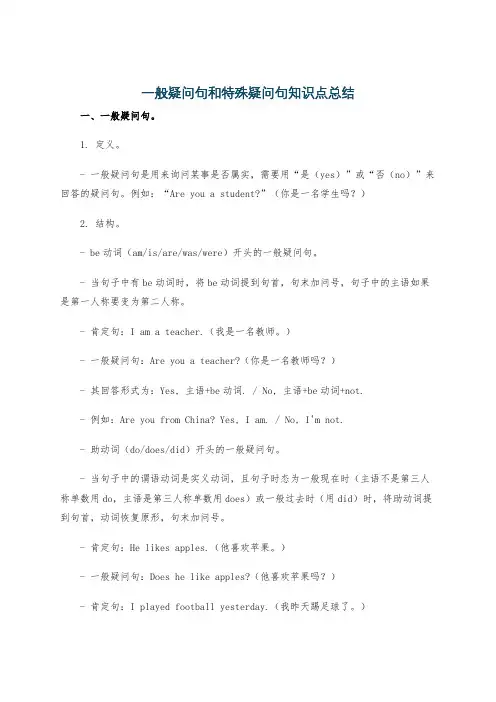
一般疑问句和特殊疑问句知识点总结一、一般疑问句。
1. 定义。
- 一般疑问句是用来询问某事是否属实,需要用“是(yes)”或“否(no)”来回答的疑问句。
例如:“Are you a student?”(你是一名学生吗?)2. 结构。
- be动词(am/is/are/was/were)开头的一般疑问句。
- 当句子中有be动词时,将be动词提到句首,句末加问号,句子中的主语如果是第一人称要变为第二人称。
- 肯定句:I am a teacher.(我是一名教师。
)- 一般疑问句:Are you a teacher?(你是一名教师吗?)- 其回答形式为:Yes, 主语+be动词. / No, 主语+be动词+not.- 例如:Are you from China? Yes, I am. / No, I'm not.- 助动词(do/does/did)开头的一般疑问句。
- 当句子中的谓语动词是实义动词,且句子时态为一般现在时(主语不是第三人称单数用do,主语是第三人称单数用does)或一般过去时(用did)时,将助动词提到句首,动词恢复原形,句末加问号。
- 肯定句:He likes apples.(他喜欢苹果。
)- 一般疑问句:Does he like apples?(他喜欢苹果吗?)- 肯定句:I played football yesterday.(我昨天踢足球了。
)- 一般疑问句:Did you play football yesterday?(你昨天踢足球了吗?)- 回答形式为:Yes, 主语+do/does/did. / No, 主语+don't/doesn't/didn't.- 例如:Do they go to school by bike? Yes, they do. / No, they don't.- 情态动词(can/could/may/must等)开头的一般疑问句。
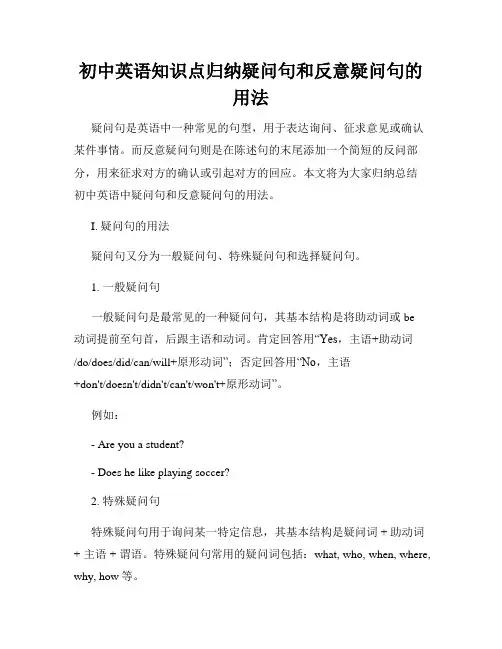
初中英语知识点归纳疑问句和反意疑问句的用法疑问句是英语中一种常见的句型,用于表达询问、征求意见或确认某件事情。
而反意疑问句则是在陈述句的末尾添加一个简短的反问部分,用来征求对方的确认或引起对方的回应。
本文将为大家归纳总结初中英语中疑问句和反意疑问句的用法。
I. 疑问句的用法疑问句又分为一般疑问句、特殊疑问句和选择疑问句。
1. 一般疑问句一般疑问句是最常见的一种疑问句,其基本结构是将助动词或be动词提前至句首,后跟主语和动词。
肯定回答用“Yes,主语+助动词/do/does/did/can/will+原形动词”;否定回答用“No,主语+don't/doesn't/didn't/can't/won't+原形动词”。
例如:- Are you a student?- Does he like playing soccer?2. 特殊疑问句特殊疑问句用于询问某一特定信息,其基本结构是疑问词 + 助动词+ 主语 + 谓语。
特殊疑问句常用的疑问词包括:what, who, when, where, why, how等。
例如:- What is your name?- Where do you live?3. 选择疑问句选择疑问句用于提供选择的问题,其基本结构是“Or”连接两个陈述句。
其中,前一陈述句用正语序,后一陈述句用部分倒装语序。
回答选择疑问句时,可以根据实际情况选择其中一个选项进行回答。
例如:- Would you like tea or coffee?- Do you prefer basketball or football?II. 反意疑问句的用法反意疑问句用于在陈述句的末尾添加反问部分,并且正反之间一般存在意义上的对立或前后关系。
基本结构为:陈述句,正反疑问句。
1. 使用助动词当陈述句中有助动词时,反意疑问句一般使用助动词的缩略形式。
例如:- You can swim, can't you?- He likes playing tennis, doesn't he?2. 使用be动词当陈述句中是be动词时,反意疑问句中使用do作为辅助动词。
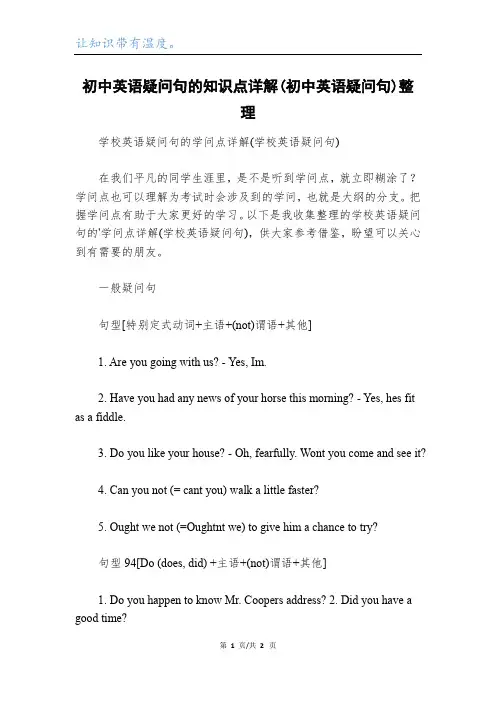
让知识带有温度。
初中英语疑问句的知识点详解(初中英语疑问句)整理学校英语疑问句的学问点详解(学校英语疑问句)在我们平凡的同学生涯里,是不是听到学问点,就立即糊涂了?学问点也可以理解为考试时会涉及到的学问,也就是大纲的分支。
把握学问点有助于大家更好的学习。
以下是我收集整理的学校英语疑问句的'学问点详解(学校英语疑问句),供大家参考借鉴,盼望可以关心到有需要的朋友。
一般疑问句句型[特别定式动词+主语+(not)谓语+其他]1. Are you going with us? - Yes, Im.2. Have you had any news of your horse this morning? - Yes, hes fit as a fiddle.3. Do you like your house? - Oh, fearfully. Wont you come and see it?4. Can you not (= cant you) walk a little faster?5. Ought we not (=Oughtnt we) to give him a chance to try?句型94[Do (does, did) +主语+(not)谓语+其他]1. Do you happen to know Mr. Coopers address?2. Did you have a good time?第1页/共2页千里之行,始于足下。
3. Does this bus take me to Oxford Circus? - Yes, get on, please.[注] 要留意对否定句的回答与汉语习惯不同,如:1. Didnt you speak to him yesterday? No, I didnt. Yes, I did.2. Arent you of the Han nationality? Yes, I am. No, I am not.反义疑问句句型[陈述句(确定),+特别定式动词(否定)+主语]1. You study English, dont you? - Yes, we do.2. They have decided not to go, havent they? Yes, they have.3. You like it, dont you?4. Hes ready, isnt he?句型[陈述句(否定),+特别定式动词(确定)+主语]1. You wont be away for long, will you? - No, Ill be back in an hour or so.【学校英语疑问句的学问点详解(学校英语疑问句)】文档内容到此结束,欢迎大家下载、修改、丰富并分享给更多有需要的人。
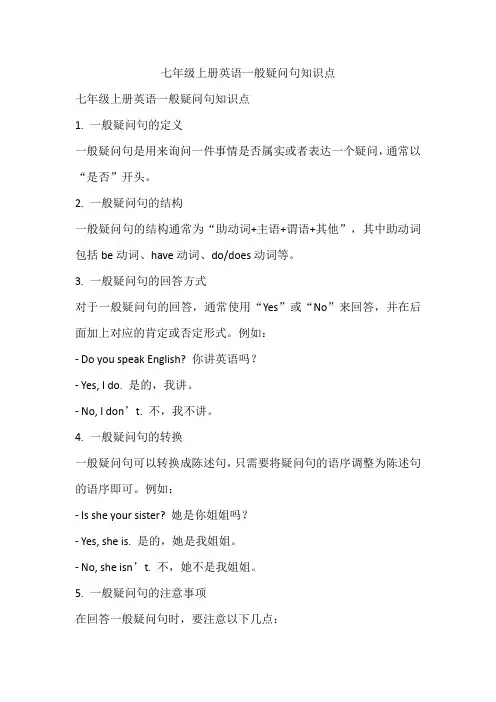
七年级上册英语一般疑问句知识点
七年级上册英语一般疑问句知识点
1. 一般疑问句的定义
一般疑问句是用来询问一件事情是否属实或者表达一个疑问,通常以“是否”开头。
2. 一般疑问句的结构
一般疑问句的结构通常为“助动词+主语+谓语+其他”,其中助动词包括be动词、have动词、do/does动词等。
3. 一般疑问句的回答方式
对于一般疑问句的回答,通常使用“Yes”或“No”来回答,并在后面加上对应的肯定或否定形式。
例如:
- Do you speak English? 你讲英语吗?
- Yes, I do. 是的,我讲。
- No, I don’t. 不,我不讲。
4. 一般疑问句的转换
一般疑问句可以转换成陈述句,只需要将疑问句的语序调整为陈述句的语序即可。
例如:
- Is she your sister? 她是你姐姐吗?
- Yes, she is. 是的,她是我姐姐。
- No, she isn’t. 不,她不是我姐姐。
5. 一般疑问句的注意事项
在回答一般疑问句时,要注意以下几点:
-首先要听清问题,并理解问题的意思;
-回答时要保持礼貌和尊重;
-对于不知道或不确定的问题,可以委婉地回答或请求对方解释;-注意时态和语序,保持语句通顺。
疑问句知识点总结疑问句是一种用来提出问题或询问信息的句子,通常以疑问代词或疑问词开头。
疑问句在日常交流中应用广泛,能够帮助人们获取所需的信息,表达好奇、疑惑或不确定的情绪。
疑问句的构成方式多样,包括倒装句、特殊疑问句和一般疑问句等。
下面将从这几个方面对疑问句的知识点进行总结。
一、倒装句倒装句是指将谓语动词或其它成分提前,主语放在谓语动词之后的句子结构。
在疑问句中,倒装句常常用于强调或转折的语境中。
常见的情况包括以下几种:1. 以“here, there, in, out, up, down”等副词开头的句子。
例如:Here comes the bus.(车来了。
)There goes the bell.(铃响了。
)2. 以表示方向的短语或副词开头的句子。
例如:Out rushed the children.(孩子们冲了出来。
)Up jumped the cat.(猫跳了起来。
)3. 表示状态、感叹或疑问的句子。
例如:Never had I seen such a beautiful sunset.(我从未见过如此美丽的日落。
)So dark is the night.(夜色如此黑)。
4. 否定词位于句首的句子。
例如:Not until last year did I realize the importance of health.(直到去年我才意识到健康的重要性。
)5. 以连词或副词短语引导的句子。
例如:Little did she know that she was being watched.(她小小的时候并不知道她正在被监视。
)Seldom does he go to the cinema.(他很少去电影院。
)倒装句的运用需要根据具体语境进行判断,同时也需要注意谓语动词的形式和语序的变化。
二、特殊疑问句特殊疑问句是以特殊疑问词开头的问句,用以询问特定信息。
特殊疑问词包括what, where, when, why, who, how等。
总结疑问句基本知识点归纳总结疑问句基本知识点归纳疑问句是语言中一个重要的句式,用于提出问题、询问信息或引起对话。
疑问句的使用需要掌握一些基本知识点,包括句法结构、语法规则和语义规则等。
下面将对疑问句的基本知识点进行归纳总结。
1. 疑问句的句法结构疑问句的句法结构与陈述句有所不同,一般由特殊疑问词/短语开头,或通过翻转主谓语序来构成。
特殊疑问词/短语包括什么、哪里、怎么样、为什么等,在句中充当疑问句的主语、宾语、状语等成分。
例如:- 你是谁?(特殊疑问词在句末)- 你喜欢什么颜色?(特殊疑问词在句中)- 你要去哪里旅行?(特殊疑问词在句首)- 你为什么不去参加派对?(特殊疑问词在句中)2. 疑问句的语法规则疑问句的语法规则包括普通疑问句、反义疑问句和选择疑问句等。
- 普通疑问句:一般在陈述句的基础上,将陈述句的语序进行翻转。
例如,“你喜欢看电影吗?”- 反义疑问句:通过在陈述句的末尾加上一个与之相对的简短问句表示反义疑问。
例如,“你喜欢看电影,对不对?”- 选择疑问句:用于提出两个或多个选择,通过特殊疑问词/短语来引导选择。
例如,“你想要咖啡还是茶?”、“你会弹钢琴还是吉他?”等。
3. 疑问句的语义规则除了句法结构和语法规则外,疑问句的语义规则也需要注意。
语义规则指的是疑问句中所提问的内容和意义。
- 是非问句:用于对某种情况、陈述或观点是否属实进行提问。
例如,“你是中国人吗?”、“你是不是很累?”等。
- 选择问句:用于询问选择关系,对限定范围内进行选择。
例如,“你喜欢吃苹果还是香蕉?”、“你要去哪个城市旅行?”等。
- 信息问句:用于询问具体信息、细节或逻辑关系。
例如,“你在哪里工作?”、“你是怎么学习英语的?”等。
综上所述,疑问句是语言中常用的句式之一,它通过疑问词/短语和翻转语序等方式来表达提问的目的。
在使用疑问句时,需要注意句法结构、语法规则和语义规则等方面的要求。
熟练掌握疑问句的基本知识点,将有助于我们更好地表达自己的问题、获取信息和加强与他人的沟通。
一、选择题1.—Your sister isn’t a nurse, is she?—________. She teaches Chinese in a primary school.A.No, she isn’t B.Yes, she is C.Yes, she isn’t D.No, she is 2.— What are those? —________.A.Those are books B.These are books C.They are books D.It’s a book 3.—Is the boy your friend? —No, ________.A.it isn’t B.he isn’t C.she isn’t D.I am not 4.—________ do you play computer games, Lily?—I only play on Friday night.A.How B.Where C.Why D.When 5.—Does your friend like hamburgers?—_______.A.Yes, he like B.No, he does C.Yes, he doesn't D.No, he doesn't 6.—Is your name Jim Green?—________.A.Yes, I am B.Yes, it isC.No, I am D.Yes, I’m7.—Is your name Kangkang? —________A.Yes, I am. B.No, I’m not.C.Yes, it is. D.Yes, it’s. 8.—Are these your schoolbags? —No, __________aren't. They are__________. A.These; their B.they; theirs C.these; ours D.they; ours 9.—Is the girl your friend? —________. Her name's Gina.A.No, it isn't. B.Yes, she is. C.Yes, it is.10.— Do you row much?— Yes, ________.A.for two hours B.quite a lot C.from five o'clock to ten 11.—Could I smoke here?—____. Look at the sign” No smoking!”A.Yes, you may. B.Of course you can.C.No, you can’t.D.No, you couldn’t.12.I am very thirsty now. But there is little water in the glass, ________?A.is there B.isn’t there C.isn’t it D.is it 13.—The surgeon hasn’t come back, has he?—_______, for he _______ Australia since last week and will be back in a week.A.No; has been in B.No; has gone to C.Yes; has gone to D.Yes; has been in 14.—Why not ________him________ some food on the way home?—Good idea!A.to ask; to buy B.ask; buy C.ask; to buy D.to ask; buy 15.—How is everything going at school ,dear ?—________.A.All right, thanks. B.Not too bad, I guessC.That’s right.D.I’m glad to hear that.16.—I’m going to visit my grandparents tomorrow.—________ telephone them in advance?A.Why not you B.You would better C.Why don’t D.Why don’t you 17.The poor man needs our help, he?A.need B.needn't C.does D.doesn't 18.—Can your brother sing or dance?— .A.He can sing. B.Yes, he can. C.He can sing or dance. 19.—Is Billy rat or thin?—________.A.Yes, he is B.No, he isn't C.He's a new boy D.He's fat 20.— __________.— He is not very handsome, but he is humorous.A.What does he look? B.What is he like?C.How does he look? D.How does he look like?21.Peter has never seen such a big fish in his life, ________?A.has he B.hasn’t he C.does he D.doesn't he 22.—Do you have an art festival at school?—Yes, ________.A.we have B.we can C.we do23.We have to swipe our student card (刷学生卡) when we get to or leave school every day, ________ we?A.do B.don’t C.have D.haven’t 24.—Hello!Are you Helen?—.My name’s Tina.A.Yes,I am B.Yes,it is C.No,I’m not25.---Eric, _____ can you have your poster been ready?---I'm not sure. We are still waiting for the final design.A.how long B.how soon C.how often D.how far【参考答案】***试卷处理标记,请不要删除一、选择题1.A解析:A【解析】【分析】【详解】句意:——你的姐姐不是护士,对吗?——对,她不是护士。
初中英语疑问句的构成与回答技巧知识点在初中英语的学习中,疑问句可是个让人又爱又恨的“小调皮”。
它就像一道道谜题,等着你去解开,有时候稍不留神,就容易被它绕晕啦。
今天,咱就来好好聊聊初中英语疑问句的构成与回答技巧这个有趣的话题。
先来说说一般疑问句。
这就好比是和英语的一次简单对话,“你是不是……呀?”比如说,“Are you a student?”(你是个学生吗?),这时候回答就简单明了,是就说“Yes, I am” 不是就说“No, I'm not” 有个小细节得注意,可别把回答弄混啦。
我记得有一次英语课上,老师提问一个同学“Is she your sister?” 那同学可能太紧张,居然回答成“Yes, sheisn't” 全班同学哄堂大笑,他自己也不好意思地挠挠头。
从那以后,大家对这个回答可都记得牢牢的,不敢再出错。
再看看特殊疑问句,这就像是深入的探索,要具体问清楚“是什么、怎么样、在哪里、什么时候、为什么”等等。
比如说,“What do you like?”(你喜欢什么?)回答就得根据实际情况,详细地说出喜欢的东西。
我曾经和同桌做练习,我问他“What color is your pen?” (你的钢笔是什么颜色?)他想都没想就回答“Blue” 我接着追问“Why do you like blue?” (你为什么喜欢蓝色?)他就愣住了,想了好一会儿才说,因为蓝色让他感觉很安静很舒服。
还有选择疑问句,这就像是给你几个选项让你挑。
“Do you like apples or bananas?” (你喜欢苹果还是香蕉?)这时候回答可不能模棱两可,得明确选一个,“I like apples” 或者“I like bananas” 有一次我在家里问弟弟,“Do you want to play football or basketball?” 他眨眨眼睛说,“I want to play basketball Football is too tiring for me” (我想打篮球。
初中英语疑问句分类及应用知识点归纳(经典版)编制人:__________________审核人:__________________审批人:__________________编制单位:__________________编制时间:____年____月____日序言下载提示:该文档是本店铺精心编制而成的,希望大家下载后,能够帮助大家解决实际问题。
文档下载后可定制修改,请根据实际需要进行调整和使用,谢谢!并且,本店铺为大家提供各种类型的经典范文,如职场文书、合同协议、策划方案、规章制度、演讲致辞、应急预案、心得体会、教学资料、作文大全、其他范文等等,想了解不同范文格式和写法,敬请关注!Download tips: This document is carefully compiled by this editor. I hope that after you download it, it can help you solve practical problems. The document can be customized and modified after downloading, please adjust and use it according to actual needs, thank you!Moreover, our store provides various types of classic sample essays, such as workplace documents, contract agreements, planning plans, rules and regulations, speeches, emergency plans, experiences, teaching materials, essay summaries, and other sample essays. If you want to learn about different sample formats and writing methods, please stay tuned!初中英语疑问句分类及应用知识点归纳初中英语疑问句分类及应用知识点归纳在我们的学习时代,很多人都经常追着老师们要知识点吧,知识点也不一定都是文字,数学的知识点除了定义,同样重要的公式也可以理解为知识点。
一、选择题1.—Is the young woman playing the violin?—________.A.Yes,she is B.No,she doesn'tC.Yes,she does D.No,he isn't2.They like playing football, ________?A.do they B.don’t they C.aren’t they D.are they3.—________ hours do you exercise every day? —Two.A.How long B.How often C.How much D.How many 4.—________— It is orange.A.What is this? B.What color is it? C.What are these? D.What color are they? 5.—Is your name Kangkang? —________A.Yes, I am. B.No, I’m not.C.Yes, it is. D.Yes, it’s.6.—__________ your name, please?—Yes, B-E-N, Ben.A.How do you spell B.How can you speakC.Can you spell D.What is7.—Where__________ your friend __________from?—He comes from England.A.is; come B.do; come C.does; come D.are; be 8.—He’s never stolen anyt hing before,______ he?—______. It’s his third time to be taken to the police station.A.hasn’t:Yes B.is;Yes C.has;Yes D.has;No9.---Is Alice writing? ---__________. She is listening to music.A.Yes, she isB.Yes, she doesC.No, she doesn’tD.No, she isn’t10.— ______ can I keep the books, madam?— For two weeks.A.How long B.How many C.How often D.How much 11.— Why ______ you like the cat?—Because she’s kind of ______.A.do; boring B.don’t; interesting C.do; interested D.don’t; boring 12.—_____ the population of the U.S.A.in 2005? —It _____ about 296 million.A.What is; is B.What was; was C.How many is; was D.How many was; is 13.—Could I smoke here?—____. Look at the sign” No smoking!”A.Yes, you may. B.Of course you can.C.No, you can’t.D.No, you couldn’t.14.— Books are our friends. ________ do you read books?— I read books every day.A.How soon B.How much C.How often 15.—________ is it from the New Town to the old city centre?—About 30 minutes by underground.A.How soon B.How often C.How long D.How far 16.— does he go to visit his grandparents?—Usually twice a month.A.How often B.How soon C.How far D.How long17.—How is everything going at school ,dear ?—________.A.All right, thanks. B.Not too bad, I guessC.That’s right.D.I’m glad to hear that.18.—________ are your shoes, dear? — Size 40.A.What’s size B.How much C.What D.What size 19.— Excuse me, ________ is it from here to Zhongshan Park?—It's about thirty minutes’ walk.A.how long B.how often C.how far D.how much 20.- ______ do you go to visit your grandparents?- Once a week.A.How far B.How much C.How often D.How long 21.—Is Billy rat or thin?—________.A.Yes, he is B.No, he isn't C.He's a new boy D.He's fat 22.一______________ do you have a medical examination?一Once a year.A.How soon B.How long C.How often D.How far 23.— Could you play the piano when you were 8 years old?— ________.A.Yes, I could B.No, I can’t C.Yes, I can D.No, I won’t 24.________your brother________ a baseball?A.Do; have B.Does; has C.Does; have D.Do; has 25.— __________ books do you read every year?— About 30, I love reading.A.How much B.How old C.How many D.How often【参考答案】***试卷处理标记,请不要删除一、选择题1.A解析:A【解析】句意:-----那个年轻女子在拉小提琴吗?----是的,她在拉小提琴。
以Is开头的一般疑问句,肯定回答,否定回答中要用is或isn’t,首先排除B,C;the young woman要用she替代,故答案为A。
2.B解析:B【解析】【分析】【详解】句意:他们喜欢踢足球,不是吗?考查反意疑问句。
do they是吗?don’t they不是吗;aren’t they他们不是吗?are they他们是吗?反意疑问词由陈述句+简短问句构成,注意“前肯后否,前否后肯”的原则,该题中陈述句是肯定的,因此反意疑问句用否定的,排除A和D;谓语动词like是实意动词,反意疑问句用助动词do构成。
故选B。
3.D解析:D【解析】【分析】【详解】句意:——你每天锻炼几个小时?——两个小时。
考查特殊疑问句。
How long多长时间;How often多久一次;How much多少钱或多少(不可数名词);How many多少(可数名词),提问数量,根据答语Two,可知用How many,此外How long和How often的后面不跟名词,由空格后的名词复数hours,所以用How many,故选D。
【点睛】How long和How often的主要区别:How long多久了(问时长),以For+时间段或since +时间点作答。
How often多经常(问频率),常以数词+ times a week(month 、year……)作答。
How much与How many的区别:都是就数量提问,但how much +不可数名词,而how many+可数名词复数4.B解析:B【解析】【分析】【详解】句意:——这是什么颜色?——这是橙色的。
考查特殊疑问句。
orange前面没有冠词,说明描述的是颜色“橙色的”;特殊疑问词用what color。
根据“It is”判断疑问句的主谓部分是单数“What color is it”。
故选B。
5.C解析:C【解析】【分析】【详解】句意:——你的名字是康康么?——是的,我的名字是康康。
考查一般疑问句。
疑问句的主语是“your name”回答用代词it来代指,肯定回答用Yes,it is; 肯定回答时it is不能缩写。
故选C。
6.C解析:C【解析】【分析】【详解】句意:——请您拼写一下您的名字好吗?——好的,B-E-N,本.考查一般疑问句,How do you spell your name, please? 请问您的名字怎么拼写?How can you speak your name, please? 你怎么能说出你的名字呢?Can you spell your name, please? 请您拼写一下您的名字好吗?What is your name, please? 请问您叫什么名字?由回答“Yes, B-E-N, Ben.”可知这是一般疑问句,并且回答的是名字的拼写,故选C。
7.C解析:C【解析】【分析】【详解】句意:——你的朋友来自哪里?——他来自英国。
考查动词,在英语中表示“来自”可用be from/come from。
观察句子,根据回答可在本句用的是come from,并且主语是第三人称单数“your friend你的朋友”,所以要借助助动词does 来变一般疑问句,并且谓语动词恢复原形,故选C。
8.C解析:C【解析】【分析】【详解】句意:——他以前从没偷过东西,是吗?——不。
这是他第三次被抓进警局了。
考查反意疑问句的基本结构。
此题考查,前否后肯,前肯后否,Never是否定词,故后半部分的疑问句要用肯定形式。
He’s never stolen anything before…的’s是has的缩写,附加句用has排除A和B;根据“It’s his third time to be taken to the police station.”可知答案应该是Yes,翻译成“不”。